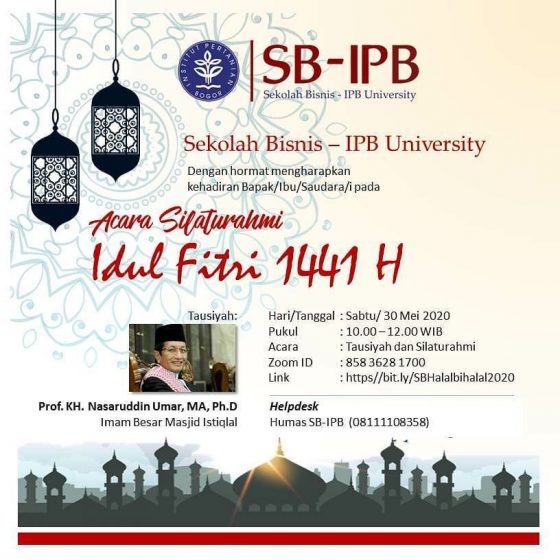
Halal Bihalal Online Eid al-Fitr 1441 H
Business School held an online Halal Bihalal (HBH) event using the Zoom Cloud Meeting application on Saturday, 30 May 2020 starting at 10.00 WIB. The HBH was attended by the Chancellor of IPB University, the Board of Trustees, the SB IPB Alumni Association, and all SB IPB academicians, as well as other invited guests totaling 279 participants. Also attending were SB IPB students from the Freeport Special Class in Tembagapura, represented by Mas Herrin.
The Halal bihalal was opened by Hanif as Master of Ceremony (MC) and begins with the recitation of the holy Quran by Ali Misri. The event was continued with a speech from the Dean by Prof. Noer Azam Achsani, who conveyed the development of SB IPB one year ago with the achievements that have been achieved, such as the Best Achievement Students S1 IPB 2020 Undergraduate Program (SB 54), KICK ANDY HEROES 2020: Sandi Octa Susila (SB Masters Program Student), 501 Fabulous Global HR Leaders Awards (SB Doctoral Program Student), 1st and 2nd place in the Action Plan Competition at the Japanese Food Industry Field Study for ASEAN Members State (AMS) won by SB IPB undergraduate and postgraduate students. In addition, three SB IPB journals are SINTA 2 accredited and there is a new journal, namely Business Review and Case Studies.
The next remarks by IPB University Chancellor Arif Satria who conveyed that everyone has the same capital as reason and the same biological aspects (nature) but needs to be built (nurture) to always build one’s capacity as a learner and benefit others. One of them is Ramadan worship, how do we take advantage of nurture which must be more progressive for the next 11 months of worship.
Tausiah was delivered by Prof. KH Nasaruddin Umar raised the meaning of friendship. There are two main attributes of Allah in Asmaul Husna, which are contained in the Basmallah lafadz, namely Ar-Rahmaan and Al-Raheem. Both of these characteristics come from the word Rahimah, which means deep love. There is also a difference between Rahmaniyah (temporary) and Rahmat Rahmat (eternal or permanent). Allah SWT puts forward Al-Rahman because he thoroughly provides love and grace. In addition, in keeping in touch, not only in love with humans but with other creatures such as plants, animals and inanimate objects. This is related to ukhuwah which was not popularized, namely Ukhuwah Makhlukiyah. There is nothing in this world that does not praise Allah. Prof. Nasaruddin told the story of Rasulullah SAW taking 7 grains of sand and asked his friends to listen. The sand that is placed in the palm of the hand cannot be heard by the sound of the prayer beads, the Prophet ordered the sand to be brought closer to the ear and there was a sound like a bee. Such is how the sand gives praise to Allah SWT. Prof. Nasaruddin also reminded us not to fight with COVID-19 because this pandemic is a disaster that serves to make us aware. The halal bihalal was closed with a joint prayer led by Mr. Bachtiar and taking a group photo for documentation via Zoom Cloud Meeting.
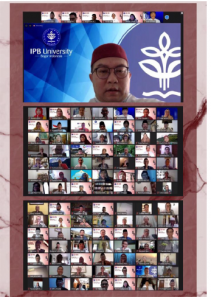
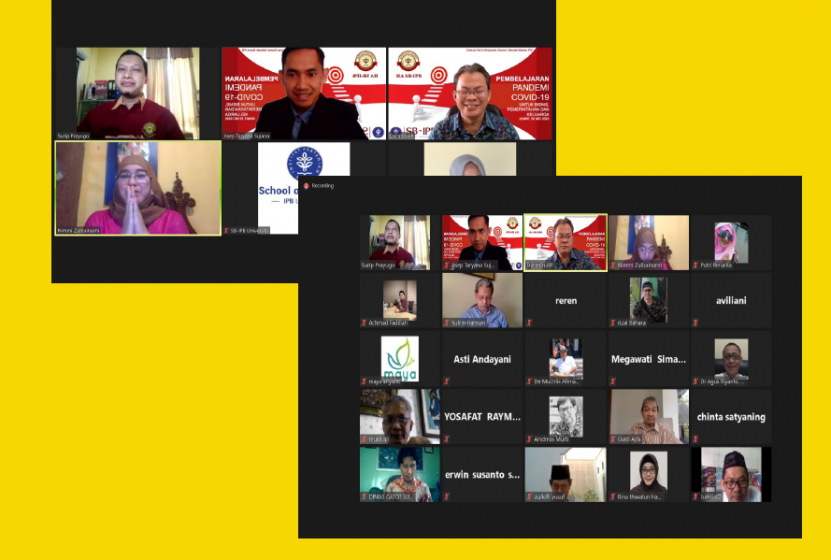
The National Seminar of the IPB Business School Alumni Association
The national seminar of the IPB Business School Alumni Association is held through the Zoom application every Friday by the IPB Business School Alumni Association, until now it has been held 5 times, the topics and themes raised vary from economic, social and other issues. This seminar was opened by the Chairperson of the SB IPB Alumni Association and the Dean / Deputy Dean of the IPB Business School. In the first week of May 1, 2020, the theme raised was “Economic Regulation in the midst of the COVID-19 pandemic. Is it a solution?” with the resource person Dr. Aviliani, he is an economist.
In the second week (08 May 2020) the theme raised was “Are MSMEs Capable of Turning Threats into Opportunities in the Covid-19 Pandemic?” Micro, Small and Medium Enterprises (MSMEs) have a very large contribution to the nation’s economy. It was recorded that in 2019, MSMEs were able to contribute 60.34% of Indonesia’s total GDP, and absorb 116,673,416 (97%) of Indonesia’s workforce. Because of this significant contribution and the theme in the second week discussing MSMEs, the IPB University Business School Alumni Association (HA SB-IPB collaborates with MSME Empowerment Activists as well as Lecturer in Master of Management at Mercu Buana University, namely Dr. Ririn Wulandari, SE, MM. Ririn highlighted growth in Indonesia’s economy in the first quarter of 2020, which was only around 2.97%, which is likely to be more complicated by the Covid-19 pandemic. This is of course an extraordinary challenge for MSME players whose conditions are currently very varied from readiness to use technology, access to markets, capital capacity , and its resource management. The many challenges faced by MSMEs must be adapted to innovation as soon as possible. There were several points that were conveyed by Ririn, including focusing on products that consumers need and want first, Value Products, utilizing technology and trying to fulfill the supply chain in regional scope in advance.
In mingg u Third (15 May 2020) This seminar with the theme “How to Win the Hearts of Consumers in the New Normal Period”. The speaker in the fifth week was Dr. Mukti Ali. He is the CEO of Marketing & Management of the Rumah Mikir Founder Academy, the President Director and owner of PT. Global Teknik Engineering and Marketing & Management Academy (MMA Center), PT. Trimukti Teknik, PT. SynergyAl Indonesia. He conveyed that in a crisis condition and after a crisis due to a disaster, especially the Covid-19 Pandemic, there was a change in Consumer Behavior and Expectations, so that a Marketer must think and act appropriately and quickly to increase Consumer Value, not just what products / services are offered, there are several important points are tips and tricks for a marketer in winning the hearts of consumers including Faster, Flexible, Agility, Speedier, Technology, Empathy, Responsive, Focused, Unique, Consistent and knowing consumers. He gave a closing statement “It is not how big and strong a company can survive during and after the COVID-19 pandemic, but how quickly the company is able to respond to adapt by adopting new ways in its business processes”. In the fourth week (22 May 2020) with the theme “Social Business during a pandemic and as a Way Out of the Economic Crisis”. Ir. Judianto Hasan, MM. He is the Director of PT. Berjaya Nusantara Energi and Chairman at APNENINDO. In the fifth week (29 May 2020) with the theme “Lessons from the COVID-19 Pandemic for Business, Government and Families”. Darmin Ahmad PXella. He is the founder of AACIM, author of “Strategy Implementation Problems” and “Performance Management Transformation”. In addition, this seminar collaborates with @sharingyuk_co, a community of social activists to donate online. At the end of the seminar, the @sharingyuk_co team explained the donation program that was being carried out, in April the community had distributed 1000 hand sanitizers to informal workers, in May it had distributed 100 packages of groceries, 150 Nasi Boxes, 120 Takjil, the products distributed were products from partners MSMEs affected by COVID-19. The number of participants in each discussion was 80-450 people consisting of various professions, namely entrepreneurs, academics, students, government and the general public.
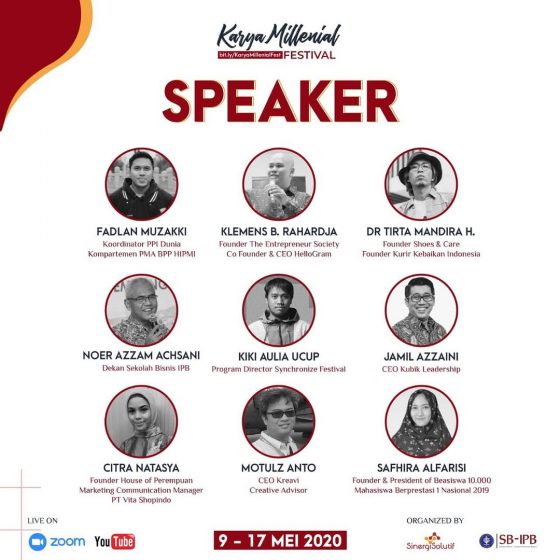
Bachelor of Business: Millennial Works Festival
Synergy Solutif is a student business collaboration movement that holds a webinar and donation program that lasts 9 days. The solution synergy team consists of 13 people, namely Sultan Firmansyah SB 54 and Satrio Wicaksono SB 55 as the founder, Fathwanurillah Dwi A SB 55, Cahyania Nursyabani SB 55, Nahla Ridhona RP SB 55, Hanna Fadhila F SB 55, Aninda Putri SB 55, 4 people from other faculties, 1 person from the Vocational School, and 1 person from the University of Indonesia FIB.
The webinar that was organized by Synergy Solutif was named Karya Millennial Festival. Karya Millennial Festival presents 10 cool speakers through zoom and live streaming on the IPB Business School youtube channel. This series of webinars was held on 9-17 May 2020. The following is a list of speakers for the Millennial Works Festival:
- Fadlan Muzakki (World PPI Coordinator), on May 9, 2020
- Klemens B. Rahardja (Founder of The Entrepreneur Society), on May 10, 2020
- Dr. Tirta (Founder Shoes & Care), on 10 May 2020
- Kiki Aulia Ucup (Director of Synchronize Festival Program), on 11 May 2020
- Jamil Azzaini (CEO of Kubik Leadership), on 13 May 2020
- Safhira Alfarisi (Founder & President of 10.000 Scholarships) ), on May 14 2020
- Soleh Hidayat (Chief Waqf Officer of Rumah Zakat), on May 15 2020
- Motulz Anto (CEO Kreavi), on May 16 2020
- Citra Natasya (Founder House of Perempuan), on May 17, 2020
- Prof. Dr. Ir. Noer Azam Achsani, MS (Dean of IPB’s Business School), on May 17, 2020
The success of the Millennial Festival’s work is not without the support of the Business School which has provided access to the IPB Business School zoom and youtube channel. Until the end of the series, there were 558 participants who had participated in the Millennial Karya Festival and the total donations that had been collected were around Rp.6,610,910. This donation will be distributed through Zakat Houses in the three areas in Java in the form of PPE which will be distributed to referral hospitals and food packages that will be given to households affected by Covid-19. This activity is carried out with the hope of being able to work again at a later date to continue to spread benefits to the wider community.
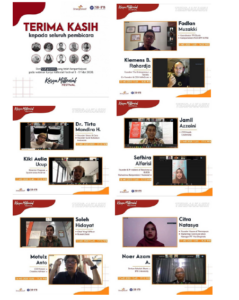
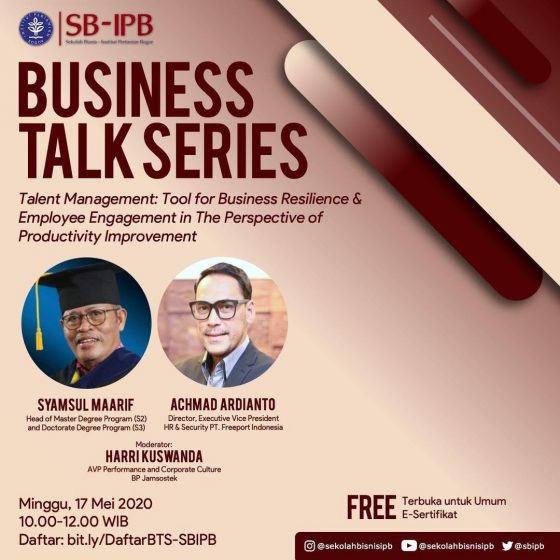
SB-IPB BUSINESS TALK SERIES #3: “Talent Management: Tool for Business Resilience & Employee Engagement in The Perspective of Productivity Improvement”
The third of Business Talk Series (BTS) was successfully carried out online on Sunday , 17 May 2020 with 400 participants. The theme discussed in this webinar was related to human resource management, namely “Talent Management: Tool for Business Resilience” and “Employee Engagement in The Perspective of Productivity Improvement” by inviting two speakers, namely Achmad Ardianto as Director, Executive Vice President of Human Resource and Security. PT Freeport Indonesia and Prof. Dr. Ir. Syamsul Ma’arif, M.Eng, Dipl.Ing, DEA as Chair of the SB IPB Postgraduate Study Program. The moderator for the third edition of BTS is Harri Kuswanda, who is the AVP Performance and Corporate Culture of BP Jamsostek.
Talent management is an important factor for businesses to survive and achieve business success. The resilience of a business is determined by its ability to adapt to environmental demands and changes that occur. The key to the success of an organization or business to survive lies in the quality possessed by human resources in it, starting from the individual level to the group level.
In business resilience, there are two important things to consider, namely market dependence (competitiveness) and industrial turbulence (speed of change). In the era of crisis due to the Covid-19 pandemic, this includes industrial turbulence, a very rapid change occurs in the business environment so that companies that are willing to survive must be able to quickly adapt.
Organizational failure is usually determined by the leadership or the nature of the organization itself. Talented people are those who are able to carry out organizational transformation and are oriented in the future. According to the informants, in an effort to deal with change, there are three main things, namely from humans, organizations and technology. However, the main key of these three things is in human quality.
Quality humans will create value for a good organization, and are able to use technology appropriately. Talented humans must abound in mindset, heart-set, and skill-set. Humans are intelligent, work sincerely, and are agile in carrying out their duties in an organization or business. Talent management is able to find and create talents that can detect future jobs. This kind of talent is able to capture, build, and apply knowledge that can be used to deal with crises that are not usually experienced by organizations or businesses because they are able to creatively detect things that can be done to overcome crises.
The topic presented by the second speaker was more specific about employee engagement in the perspective of increasing productivity. The orientation of the business is indeed profit (in broad terms, both for the company and the environment and society) which can be achieved by increasing productivity.
The best way to increase productivity is to invest in human resources. Basically, productivity is the output that a company produces from the inputs that the company must manage. According to Mr. Achmad Ardianto, talent is a part of input (which includes talent, machine, material, energy). Talent effectiveness is closely related to employee engagement (talent willingness) and employee enablement (talent ability). The most effective talents are those with high willingness and ability. The determinants of talent effectiveness, including enablement, are tools and environment, while engagement includes passion and skills. The four elements must be complemented by elements of leadership.
According to the informants, the most effective and efficient way to improve these elements is to increase leadership, so that other elements can be raised. A leader must be able to motivate, inspire, direct, support, empower, and be willing to be a role model. Currently, the leadership model must shift from a transactional to a transformational model.
It can be concluded from the discussion of these two speakers that proper human resource management is the key to success in maintaining and achieving organizational or business success even in times of crisis. The key to increasing the effectiveness of talented human resources from organizations or businesses is leadership that is oriented towards a transformational model.
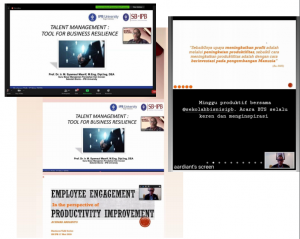
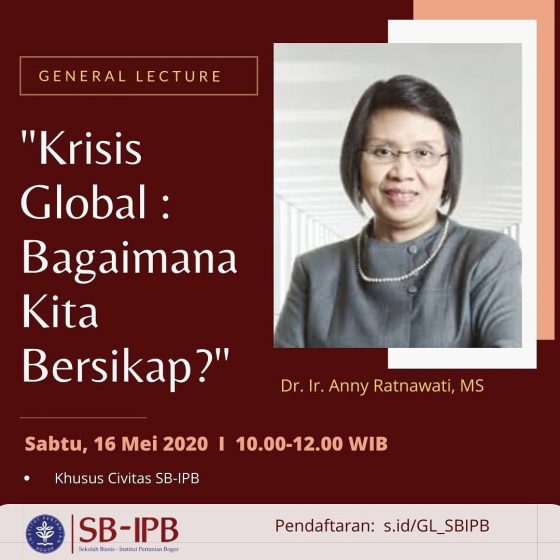
General Lecture “The Global Crisis: How Do We Act?” By ; Dr. Ir. Anny Ratnawati, MS
IPB Business School organizes general a special lecture for the SB-IPB community with speakers. Dr. Ir. Anny Ratnawati, MS (16/5). Sheis a lecturer at IPB Business School, at the same timepractitioners who had served as Representatives Minister of Finance. There were 132 participants following the general lecture on the theme “CrisisGlobal: How Do We Act? ”. Activities opened and moderated by Prof. Noer Azam Achsani as Dean of the SB IPB Business School at 10.00 WIB, followed by an explanation by the speaker. Data was shown at the beginning of the presentation world economy and growth predictions global economy 2020 will be tough enough. Dr. Ir. Anny Ratnawati also conveyed that the predicted numbers have never happened where almost all countries experience economic contraction simultaneously. On projectionIndonesia’s growth itself shows divergence amid the uncertainties predicted by various institutions.
Dr. Anny briefly discussed the crisis experienced by Indonesia in 1997-1998, 2011, and 2018 as material for reflection so that we can best respond to the current crisis. Further the data shows that economic activity in almost all countries especially in the service sector showed a sharp decline in March 2020. Data Volatility Index initially increased in January to March, began to declinein April which showed less volatility. Hopefully this is a relatively stable signal because in some countries, the effects of COVID-19 can be controlled. Other data shows that the increase in inflation in Indonesia is considered very low, amounting to 0.08 percent because generally if you enter the month of Ramadan and approach Eid al-Fitr, there will be relative inflationhigh.
Another interesting data is that Indonesia’s trade balance was surplus in March amounting to 743.4 million US Dollars. This surplus was caused by a faster decline in imports than export. It was also stated that monetary and fiscal policies need to be encouraged to improve consumption, investment, state spending, and to cover the possibility of insufficient net exportsin driving the economy. The 2020 APBN adjustments are one example of how fiscal expansion is carried out. Widening a deficit of more than 3 percent is due to decreasing state income, while state spending must improved in relation to emergency response. In this case the government has implemented a counter syclical policy.
Then how do we behave or respond to this COVID-19 crisis? So as not to fall too deep, hence food stability must be the key, including availability, distribution and price. Learning Furthermore, from the past crisis, political stability must be maintained, must ensure the group. The lower class has sufficient life and food needs, and maintains the middle class society don’t panic. In essence, as a good society, what needs to be done is to maintain body immunity, lifestyle, and follow the rules that are enforced. At the end of his presentation, he emphasized that a country must have three main resilience namely food, energy and water security.
The discussion and question and answer session was very interactive, various problems were discussed and discussed in the Virtual Room Zoom. At the beginning of the discussion, Bu Anny provoked him by saying one question “what to do with the demographic dividend that is starting to happen now with peak in 2050? ”. Followed by various questions from the participants regarding crisis 2020, demographic bonuses, local food, village funds, banking risk in times of crisis, assistance Direct Cash (BLT), to matters relating to export-import and resource utilization local power. At the end, was conveyed by Mrs. Anny, “Let us keep the spirit and believe that this crisis is ends soons and contains a goodness. With difficulties, there must be convenience, stay positive thinking
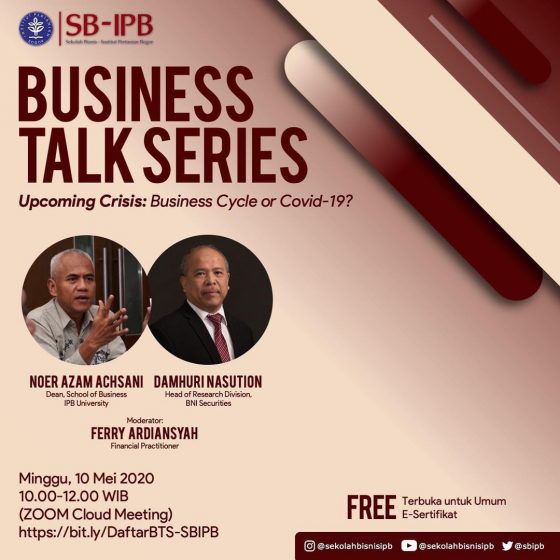
SB-IPB BUSINESS TALK SERIES #2: “Upcoming Crisis: Business Cycle or Covid-19?”
IPB Business School held an online Business Talk Series (BTS) with the theme ‘Upcoming Crisis: Business Cycle or Covid-19?’ (10/5). Damhuri Nasution as Head of Research BNI Sekuritas and Mr. Noer Azam Achsani as Dean of the IPB Business School were presented as speakers. In addition, the second edition of the BTS online talk show was also broadcast via the IPB Business School Youtube account.
The online talk show was hosted by Ferry Ardiansyah who acted as moderator and practitioner who was active in the financial and banking sector. Mr. Idqan Fahmi as Deputy Dean of Academic Affairs SB IPB gave a speech as well as introduced briefly about SB IPB. The first presentation related to ‘Introduction to Business Cycle Analysis and Its Application’ was delivered by Damhuri Nasution as Head of Research BNI Sekuritas. The man who graduated from IPB statistics started his presentation by introducing econometric theory and time series as projection tools that can be used in analyzing business cycles. Business cycle analysis is useful as input for investing in the capital market, input for the banking sector in credit expansion and potential deposits, counter cyclical policy formulations, business expansion, and launching of new products for business actors. He conveyed that the crisis could not be avoided, but the impact of the risks could be mitigated.
The second presentation was delivered by Noer Azam Achsani with the topic ‘The Next Global Recession: Business Cycles or Covid-19?’ which discusses the business cycle, business cycle analysis as an early warning system, Covid-19, and steps that must be taken after the crisis and the Covid-19 pandemic. He said that the economic cycle takes place regularly and repeats itself from time to time. This provides a signal for us to understand the future direction of the economy (GDP) so that policies / decisions can be made appropriately. The economic slowdown has occurred throughout the world including in Indonesia since 2018 before the Covid-19 pandemic. The economic downturn affects all parties, including households, MSMEs, corporations and the financial sector. He concluded that the economic cycle was indeed heading for a crisis, Covid 19 made the crisis come faster and worse.
The discussion and question and answer session was very interactive, the discussion participants even suggested that SB IPB initiate the establishment of a Business Cycle Center as a center for business cycle analysis in Indonesia. This was greeted positively by Prof. Noer Azam Achsani as Dean of the School of Business. Every crisis has its end, stay safe everyone! (FK)
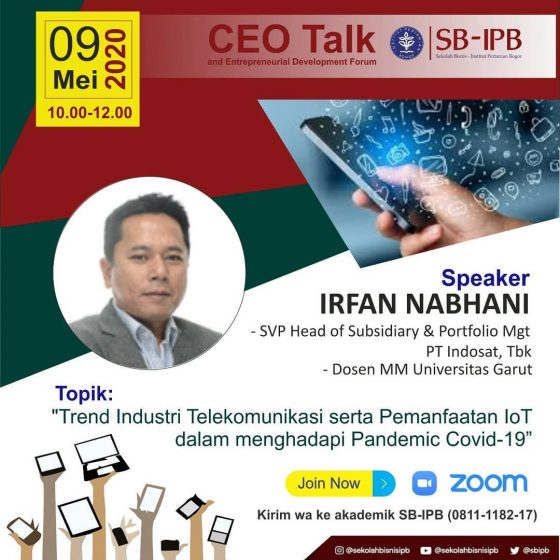
CEO Talk & Entrepreneurial Development Forum: Trends in the Telecommunication Industry and the use of IoT in the face of the COVID-19 Pandemic
Class of Capita Selecta Management and Business (KSMB) on Saturday 9 May 2020 was attended by E69 and E70 classes via Zoom Cloud Meeting. Dr. Irfan Nabhani who is SVP Head of Subsidiary & Portfolio Mgt PT Indosat, Tbk delivered the material “New Telco Order”. He has more than 15 years of experience in the Indonesian telecommunications industry. S1 education was completed at UNPAD, S2 at ITB and S3 at SB-IPB.
The Covid-19 pandemic has brought significant changes in our lives, one of which is the role of the virtual or digital world. The telecommunications sector has a big role in this situation, namely (1) provide business critical connectivity and network resilience, (2) keep business runny by means of video and remote collaboration tools, and (3) keep families together (informed & entertained) during social isolation. In the short term, the telecommunications sector faces several risks such as (1) risk of traffic explosion, traffic exceeding network capacity, (2) risk of deployment on network deployment, partner / government ecosystem, and (3) risk on revenue, customer spending pattern change. . Technology 4.0 trends in terms of current and future applications can be categorized into mobility, industrial IoT (IIoT), mass market / retail, health, and supplies.
Indosat IoT and digital applications can be categorized into logical layer, physical layer and connectivity layer. Some of the digital solutions implemented by Indosat IoT are Netfleet, Productivity Monitoring, iKanvas. The discussion sessions were very lively with many students asking questions and sharing experiences. The speaker emphasized the importance of building an ecosystem, so that each actor can jointly develop equitable digital access for all of Indonesia.

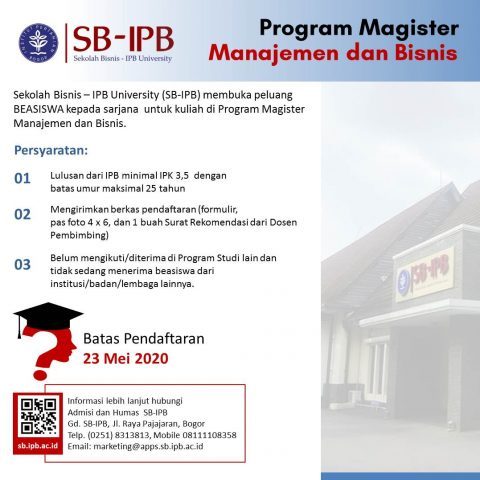
Beasiswa Magister Manajemen dan Bisnis
Sekolah Bisnis IPB-University (SB-IPB) membuka peluang BEASISWA kepada Sarjana IPB untuk kuliah pada Program Magister Manajemen dan Bisnis Gelombang 1 Tahun 2020.
Persyaratan :
- Lulusan dari IPB minimal IPK 3,50 dengan batas umur maksimal 25 tahun.
- Mengirimkan berkas pendaftaran (Formulir, Pas Foto 4×6, dan 1 buah Surat Rekomendasi dari Dosen Pembimbing, Bukti Transfer Biaya Pendaftaran sebesar Rp. 750.000).
- Belum mengikuti/diterima di Program Studi lain dan tidak sedang menerima beasiswa dari institusi/badan/lembaga lainnya.
Batas Pendaftaran Tanggal 23 Mei 2020.
Pemberkasan dikirimkan via email : marketing@apps.sb.ipb.ac.id dan konfirmasi ke Bagian Admisi SB IPB melalui Nomor WhatsApp : 08-1111-08-358 (Chat Only).
Hanya kandidat terbaik dan memenuhi kualifikasi yang akan kami proses.
Informasi lengkap mengenai Program Magister Manajemen dan Bisnis SB-IPB.
Unduh Informasi:
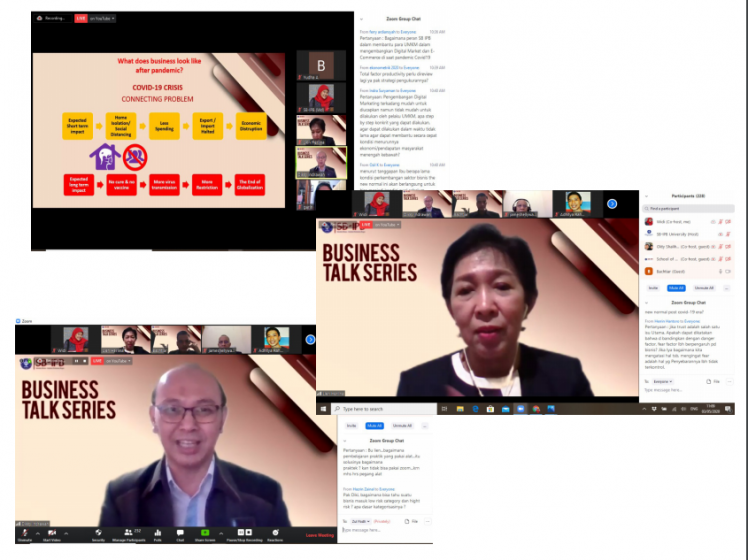
SB-IPB BUSINESS TALK SERIES #1: “Covid-19: Implication for Business in Indonesia & Occupational Disease and The Rise of Digital Marketing Roles”
SB IPB, BOGOR – The inaugural Business Talk Series (BTS) was successfully carried out online on Sunday , 3 May 2020 with 230 participants, dominated by general participants. The topics discussed at the seminar as well as a discussion forum this time were related to COVID-19, namely “Occupational Diseases and The Rise of Digital Marketing Roles” and “Implication for Business in Indonesia” by inviting two speakers who were lecturers of the IPB University Business School, namely, Ir. Lien Herlina, MSc and Dr. Raden Dikky Indrawan, SP, MM.
The webinar started at 10.05 WIB guided by Muchamad Bachtiar, STP, MM as the moderator. The SB IPB lecturer who is also a graduate of IPB organized the event until the discussion session ended. Dean of SB IPB, Prof. Dr. Ir. Noer Azam Achsani, MS opened the event with a short speech accompanied by a brief introduction to SB IPB, followed by Ms. Lien Herlina as the first speaker. He said that COVID 19 has exposed many work activities and has also caused many hidden victims. Furthermore, he explained that COVID-19 was not explicitly included as the infectious virus according to ILO proceedings so that there was no clear protection scheme for workers who had a high risk of being exposed to COVID-19. Therefore, it is important for every country to assess COVID-19 as occupational diseases, which kill more workers than work accidents with a ratio of 7: 1.
The New Normal is said to be a new condition after COVID-19 which is dominated by two things, namely the health protocol and all activities carried out from home or the current trend is called work from home (WFH). This is proof that the Internet of Things (IoT) is increasingly reliable, which can be seen from the big role of e-commerce and digital marketing. He also conveyed that COVID-19 from an entrepreneurial perspective has hit almost all the veins of Indonesia’s business structure, the majority of which are based on people mobility and the people crowd so that economic growth is predicted to slow down in 2020-2021. Therefore, every business needs a mental readiness to bounce back with several strategic options, namely compounding with The New Normal with the novelty and courage to think beyond, or giving up the business because it is unable to adapt.
A further explanation was given by Mr. Dikky Indrawan. It is said that the basis for disruption at this time is a matter of concern for everyone, namely the health issue which has become The New Game Changer. This is due to the rapid development of information that has made the uncertainty of COVID-19 the highest for the past 15 years. COVID-19 is also considered to be the most impactful crisis because it causes connecting problems. It was also emphasized that current social distancing does not eliminate the virus, but businesses must continue to run even though a vaccine has not been found. Not to mention other causes of uncertainty that may arise, such as second waves and disease seasonality, which businesses must also respond to quickly. There are several scenarios in The New Normal condition that require every business to take maneuvers because the worst-case scenario can occur which has an impact on de-globalization. He also conveyed that the restriction impact on the business sector varies, from the lowest to the highest, along with various business clusters and how businesses can respond to this condition. The first thing to respond to is cash flow, which includes input, operation and output. In output management, business actors must be able to maintain consumer confidence so that they must make changes to products. This has an impact on operation management which will experience changes in the aspects of human resources, IT and systems, operations, production design, and communication. In the end, this will lead to changes in input management.
The conclusion is uncertainty must be defeated with the principle that every business is a healthy business, must be able to solve problems and think about the future. In addition, business adjustments must be made to maintain consumers and financial conditions. The most important thing is responsible leadership that can understand and care about business resilience. (Faa)






Recent Comments